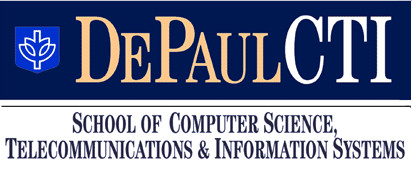

|
||
Syllabus |
||
ECT 250 |
|
Survey of e-commerce technology |
Section 603 |
Monday/Wednesday, 3:10 - 4:40 pm, Loop |
|
Professor: Amber Settle |
243 S. Wabash Avenue, Room 748 Chicago, IL 60604 Phone: (312) 362-5324 FAX: (312) 362-6116 asettle@cs.depaul.edu http://facweb.cs.depaul.edu/asettle/
Tuesday 3:00 - 5:00 pm Wednesday 5:00 - 6:00 pm
Please make use of my office hours! Asking questions about the assignments or material covered during lecture can improve your understanding enormously. It will also let me know if I need to review a topic or idea in class. If you are unable to see me during my office hours, please contact me to make an appointment.
The required textbook for the course is Electronic Commerce, Second Annual Edition by Gary P. Schneider and James T. Perry, Course Technology, 2001, ISBN 0-619-03378-9.
There is a course web page located at http://facweb.cs.depaul.edu/asettle/ect250/section603/. Assignments will be available only on the web page. Announcements will also be posted to the web pages. Please get into the habit of checking the course pages often.
This course provides a general survey of the key technological elements of e-commerce and provides insight into e-commerce infrastructures. It also briefly covers important business strategies essential to maintaining e-commerce infrastructures. The web application FrontPage is also introduced.
A detailed topic list is given below:
If time permits, we may cover additional topics.
There will be weekly assignments, a midterm, and a final. The midterm and final will be cumulative. The midterm exam will be on Wednesday, May 2nd, 3:10 - 4:40 pm. The final exam will be on Tuesday, June 12th, 2:45 - 5:00 pm. Make-up exams will not be given. If there is an extreme emergency and you must miss an exam, you must notify me in advance and provide documented evidence of the emergency. In those cases, you are responsible for talking to me as soon as possible about alternative arrangements.
The course grade will be computed on the following basis:
Assignments 30 % Midterm exam 35 % Final exam 35 %
You must earn a passing grade on the midterm and final to pass the course.
Each assignment will have a posted deadline. Any assignment handed in
after the deadline will be considered late. Assignments that are late will lose 20% of the points for each
day that they are late. No assignment will be accepted more than four days after its due
date (including Saturdays, Sundays, and holidays). Assignment deadlines will be strictly enforced; however, your lowest homework score will be dropped in the calculation of your final
grade.
Cheating is any action that violates university norms or instructor's guidelines for the preparation and submission of assignments. This includes, but is not limited to, unauthorized access to examination materials prior to the examination itself; use or possession of unauthorized materials during the examination or quiz; having someone take an examination in one's place; copying from another student; unauthorized assistance to another student; or acceptance of such assistance. Plagiarism involves the presentation of the work of another as one's own. Plagiarism includes, but is not limited to the following: the direct copying of any source, such as written and verbal material, computer files, audio disks, video programs or musical scores, whether published or unpublished, in whole or part, without proper acknowledgment that it is someone else's; copying of any source in whole or part with only minor changes in wording or syntax, even with acknowledgment; submitting as one's own work a report, examination paper, computer file, lab report or other assignment that has been prepared by someone else (including research papers purchased from any other person or agency); the paraphrasing of another's work or ideas without proper acknowledgment.
The use of others' web/publication content (text, graphics, code) is regarded as plagiarism if credit is not given (see the above description of plagiarism). When you directly quote someone's work, you must put it in quotation marks. Without such quotations and reference, it is regarded as an act of plagiarism (see the above description of plagiarism). Using materials that the student prepared for other purposes (e.g., for another course or for his/her work) needs the course instructor's prior permission.
A charge of cheating and/or plagiarism is always a serious matter. It can result in an automatic F in the course and possible expulsion.
An incomplete grade is given only for an exceptional reason such as a death in the family, a serious illness, etc. Any such reason must be documented. Any incomplete request must be made at least two weeks before the final, and approved by the Dean of the School of Computer Science, Telecommunications and Information Systems. Any consequences resulting from a poor grade for the course will not be considered as valid reasons for such a request.